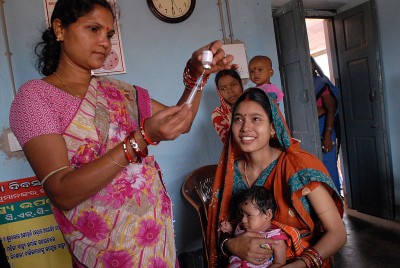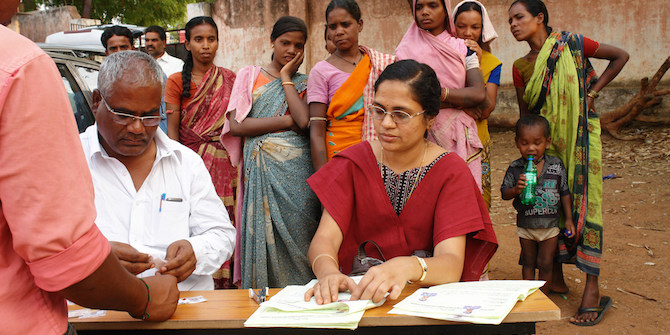Susan A. Papp, Aparajita Gogoi, and Catherine Campbell present a case study of efforts to improve service accountability in Odisha, India, focusing on the role of local women, intermediary groups, health providers and elected politicians.
Millennium Development Goal Five (MDG5a) – the reduction of maternal mortality by 75 per cent from 1990 to 2015 – remains one of the MDG’s toughest targets. The number of women who die annually from pregnancy and labour complications is 287,000, and 99 per cent of these deaths occur in the developing world. While decades of advocacy are yielding improvements in mothers’ health in some settings, policy implementation lags in others.
Drivers of poor maternal health include low awareness of the dangers of childbirth and how to avoid them, lack of value given to women’s health in many settings, women’s lack of confidence and power to assert their needs, economic inequalities and poor health care provider commitment to women’s well-being. These problems are particularly acute in India, which has the highest absolute number of maternal deaths (56,000) globally.
Public and private entities in India often have weak capabilities to self-regulate and enforce accountability. Consequently, ‘social accountability’ – citizen-led, hybrid forms of accountability – has been identified as a key pathway to improved health, development and governance. ‘Social accountability planning’, emphasising community mobilisation, potentially empowers women to assert their entitlements to health and creates environments where policymakers and service providers recognise the urgency of policy implementation, interventions and services.
We provide a case study of a social accountability initiative in the state of Odisha, India: in 2006, the White Ribbon Alliance for Safe Motherhood in India embarked on a social accountability programme to address high maternal mortality and the inadequate implementation of maternal health programmes, using three tools: (1) maternal death audits via verbal autopsies, (2) health facility checklists and (3) public hearings and rallies to bring women together with government officials and service providers to address grievances around maternal care. Our study seeks to identify the processes and psycho-social pathways through which social accountability is mediated in an effort to contribute to understandings of its potential in improving policy implementation and quality of care.
The study is framed by Asha George’s conceptualisation of social accountability “as a referee of the dynamics in two-way relationships, between often unequal partners”. George asserts that three key elements of social accountability – information, dialogue and negotiation – support marginalised groups in confronting disempowering relations, generating actionable representations of the drivers of neglect and strategies for tackling them and transforming the way dominant and marginalised participants view themselves and their inter-relationships. This study aims to expand on the empirical base for George’s framework by identifying three new complementary processes, as demonstrated through the alliance’s work: (1) generating demand for rights and better services via information, (2) leveraging intermediaries to legitimise the demands of poor and marginalised women via dialogue and (3) sensitising leaders and health providers to the needs of women through external and internal levers via negotiation.
At a programmatic and systemic level, social accountability efforts in Odisha are generating a positive impact on women, intermediaries, service providers and government leaders. Social accountability efforts, such as the public hearing, are providing new ways for women to collectively voice their concerns and demands in a supported space. These demands are being reinforced and legitimised by intermediary partners such as local elected officials and the media, leading to an enhanced receptivity to women’s needs on the part of the leaders. Among the service providers and government leaders, the alliance’s social accountability efforts are catalysing new levels of understanding around the gaps in the system. This new understanding opens up many opportunities for improved service delivery.
Perhaps the most significant finding of the study was the discovery that subtle mindsets – among both marginalised women as well as leaders and service providers – play as much of a role in the success or failure of social accountability as any manifest factors and structural barriers. Informants were unanimous in noting that a change of mindset and the ability to generate a sense of concern were essential for realising a system that is more socially accountable. This discovery has implications that could impact the government’s response to maternal health. In addition to working to improve infrastructure and increase the number of skilled health workers, our findings suggest the parallel need for government officials to further explore and scale up community monitoring efforts to facilitate a change in the mindset of providers, patients and local leaders alike.
While public hearings provide a critical forum and can promote accountability, it is one step and one tool of many needed to achieve sustainable social change. This type of long-term change can only be achieved through a combination of top-down (checklists, verbal autopsies, public interest litigation and special rapporteur visits) and bottom-up (public hearings, report cards and community monitoring) accountability tools that challenge the ingrained socio-cultural norms that perpetuate health disparities in the first place.
For more information on this topic, see: Susan A. Papp , Aparajita Gogoi, and Catherine Campbell (2013) Improving maternal health through social accountability: A case study from Orissa, India, Global Public Health: An International Journal for Research, Policy and Practice, 8:4, 449-464.








